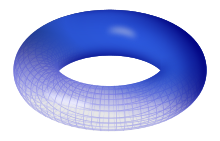Betti number
In the mathematical sub-area of topology , the Betti numbers are a sequence of nonnegative integers that describe global properties of a topological space . By Henri Poincaré was shown to topological invariants are. He named the numbers after the mathematician Enrico Betti because they are a generalization of the area numbers introduced by Betti in his work on complex algebraic surfaces .
definition
It is a topological space . Then the -th Betti number is of
- For
Here referred to the th singular homology group with coefficients in the rational numbers.
Intuition
Although the definition of Betti numbers is very abstract, there is an intuition behind it. The Betti numbers indicate how many k-dimensional non-connected areas the corresponding topological space has. The first three Betti numbers clearly state:
- is the number of path connection components .
- is the number of "two-dimensional holes".
- is the number of three-dimensional cavities.
The torus shown on the right (meaning the surface) consists of a connected component, has two "two-dimensional holes", one in the middle and the other one inside the torus, and has a three-dimensional cavity. The Betti numbers of the torus are therefore 1, 2, 1, the other Betti numbers are 0.
However, if the topological space to be considered is not an orientable compact manifold , then this view fails.
properties
- is the number of path-related components of .
- is the rank of the abelized fundamental group of .
- For an orientable closed surface from sex is , , .
- In general, the Poincaré duality applies to every -dimensional orientable closed manifold :
- For every -dimensional manifold holds for .
- For two topological spaces and applies This is a direct consequence of the set of Künneth .
Examples
- The Betti numbers of the - sphere are
- The Betti numbers of the real projective plane are just like those of a single point and of every convex set im . Two very different rooms can therefore agree in all Betti numbers.
Related terms
The Euler characteristic is the alternating sum of the Betti numbers, i.e. H.
literature
- Edwin H. Spanier: Algebraic Topology. 1. corrected Springer edition, reprint. Springer, Berlin a. a. 1995, ISBN 3-540-90646-0 .
- MI Voitsekhovskii: Betti number . In: Michiel Hazewinkel (Ed.): Encyclopaedia of Mathematics . Springer-Verlag , Berlin 2002, ISBN 978-1-55608-010-4 (English, online ).
Web links
- Eric W. Weisstein : Betti Number . In: MathWorld (English).
Individual evidence
- ^ Hatcher: Algebraic Topology . math.cornell.edu Proposition 2.7
























